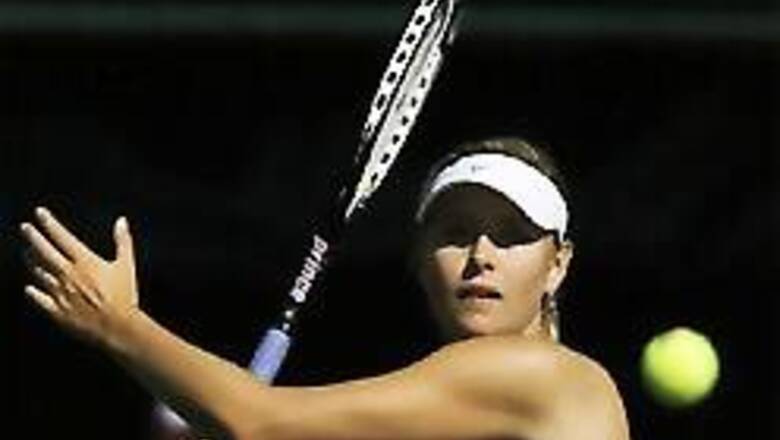
views
Paris: Maria Sharapova did not go quietly. No, her departure from the French Open was filled with sound and fury: her stroke-accompanying shrieks, her self-loathing shouts between points and the spectators' hearty boos and high-pitched whistles that ushered the No. 1-seeded woman to the exit.
One point from reaching the quarterfinals at the only Grand Slam tournament she's never won, Sharapova allowed every bit of a significant lead slip away Monday and collapsed to a 6-7 (6), 7-6 (5), 6-2 defeat against No. 13 Dinara Safina.
''Oh, I was angry,'' Sharapova said. ''I was angry for making unforced errors, for not taking some of those balls and just ripping them.''
Her fourth-round departure was the most startling development on a day that included this footnote: The last US man or woman playing singles at Roland Garros, 88th-ranked Robby Ginepri, was eliminated 7-6 (4), 6-3, 6-1 by No. 24 Fernando Gonzalez of Chile.
''A five-hour 'grindfest' would have favored me a little bit more,'' said Ginepri, 0-5 at the French Open before this year. ''I tried to end the points too quickly.''
Gonzalez now faces No. 1 Roger Federer in the quarterfinals in a rematch of the 2007 Australian Open final that Federer won for one of his 12 Grand Slam titles. No. 5 David Ferrer will meet Gael Monfils in another quarterfinal.
Rounding out the rough showing for Americans in Paris, the top-seeded men's doubles team of twins Bob and Mike Bryan was upset by Pablo Cuevas of Uruguay and Luis Horna of Peru 6-3, 5-7, 7-6 (1) in a quarterfinal that ended in a downpour - and with a bit of rancor.
When the teams switched sides during the third-set tiebreaker, Cuevas celebrated his duo's 5-1 lead by leaping over the net. So the Bryans didn't shake his hand when the match finished.
The US Davis Cup doubles pair was more disturbed by the country's overall showing on clay.
''I guess we were holding the flag there at the end,'' Mike Bryan said. ''We'll suit it up at Wimbledon and see how it goes.''
Sharapova figured it wouldn't take long to get over Monday's setback and start focusing on the All England Club, where she won her first Grand Slam title in 2004 at age 17.
With last month's retirement of top-ranked Justine Henin, and last week's losses by Venus and Serena Williams, Sharapova appeared to have a clearer-than-usual path to success at the clay-court major. She was one of only two women with a Slam title to her credit among the final 16 players, but will have to wait for another year in Paris.
''I came very close,'' Sharapova said.
She led 5-2 in the second set, and went up 40-30 while serving for the match at 5-3. But Safina erased that chance with a backhand winner, and eventually broke when Sharapova missed a forehand. In the ensuing tiebreaker, Sharapova took a 5-2 lead, but Safina claimed five straight points.
''It can go in the wrong direction really fast,'' Sharapova said. ''It just started going that way.''
Until now, Safina was best known for being the kid sister of Marat Safin, who won the 2000 US Open and 2005 Australian Open. She shares his broad shoulders and short temper, but thus far had not displayed quite as much talent or taste for the big stage, never advancing beyond the quarterfinals at a major.
Even after beating Sharapova, she didn't exactly display bravado. Asked whether she could win the title, Safina puffed her cheeks, exhaled loudly, and replied, ''I mean, it's not easy.''
So who could have been surprised that she wasted two set points at 6-4 in the first tiebreaker? After blowing the second set point, she spiked her racket precisely the way Marat does, drawing a warning from the chair umpire.
''I'm not the girl to keep all the emotions I have inside,'' Safina said. ''I guess I have to pay lots of fines because that's the way I am.''
She now faces No. 7 Elena Dementieva, the 2004 French Open finalist who beat No. 11 Vera Zvonareva 6-4, 1-6, 6-2 in another all-Russian match Monday.
Two other women's matches were suspended because of darkness. No. 4 Svetlana Kuznetsova, the 2004 US Open champion, led No. 16 Victoria Azarenka 6-2, 2-2, while Petra Kvitova and Kaia Kanepi, two unseeded players, split two sets.
For Sharapova, things really began to fall apart when she served while trailing 3-2 in the third set.
At 15-love, Safina's forehand landed near a line, and Sharapova missed a backhand. Sharapova asked the chair umpire to check the mark from Safina's shot, drawing scattered noise from the crowd, and the call stood.
On the next point, Sharapova botched a sitter and put a forehand into the net - drawing cheers, generally considered a breach of etiquette among tennis spectators. Another short ball came at 15-30, and perhaps wary of another miscue, Sharapova sent it back cautiously, allowing Safina to pound a forehand. That prompted a scream from Sharapova.
As play proceeded, her yells became louder and louder as she berated herself, at least once with colorful language.
''You sometimes get a little too negative on yourself,'' Sharapova said.
After erasing three break points in that game, Sharapova netted two forehands in a row, ceding the break. Now it was Safina's turn to let it out: She raised a fist and bellowed. A match in which she was playing from so far behind for so long was now in her control, and she did not let go, collecting 10 of the final 12 points - including Sharapova's seventh double-fault of the match, 43rd of the tournament.
When it ended, Safina dropped to her knees to celebrate. Sharapova quickly collected her things and left without acknowledging the fans who jeered her on the way out.
''I can't please everyone. That's not in my 'J.D.' - not in my job description,'' she said.
''I mean, they paid the ticket to watch me,'' she added, ''so they must appreciate me on some level, right?''
Sharapova moved up from No. 2 to No. 1 when Henin quit, but the stay might be brief. Ana Ivanovic, Jelena Jankovic and Kuznetsova all could lead the rankings by the end of the week. Sharapova was asked about the possibility of losing her spot at the top.
Her reply? ''Boohoo.''












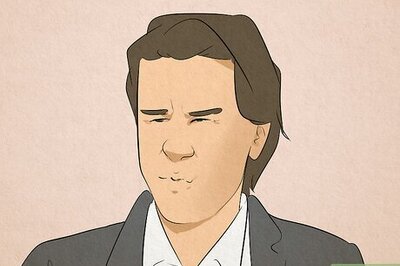
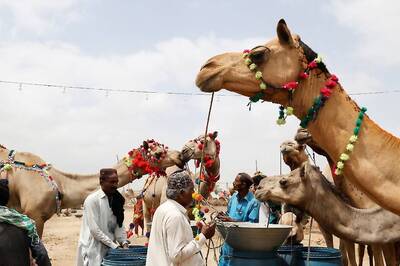
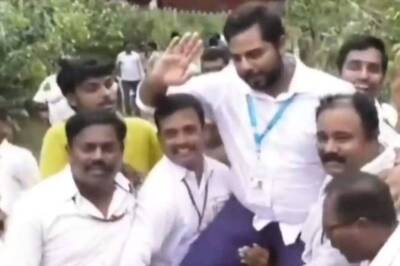
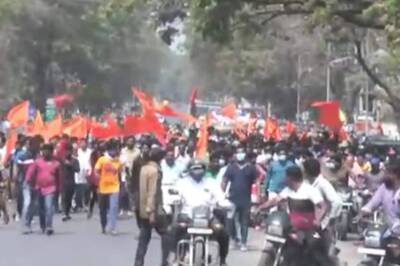
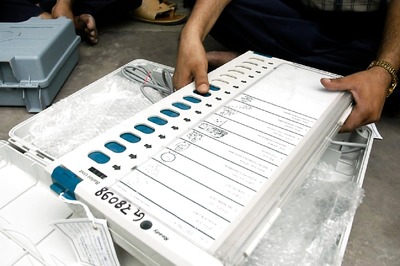
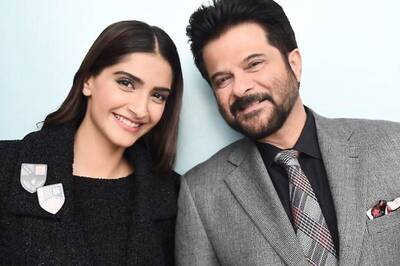
Comments
0 comment